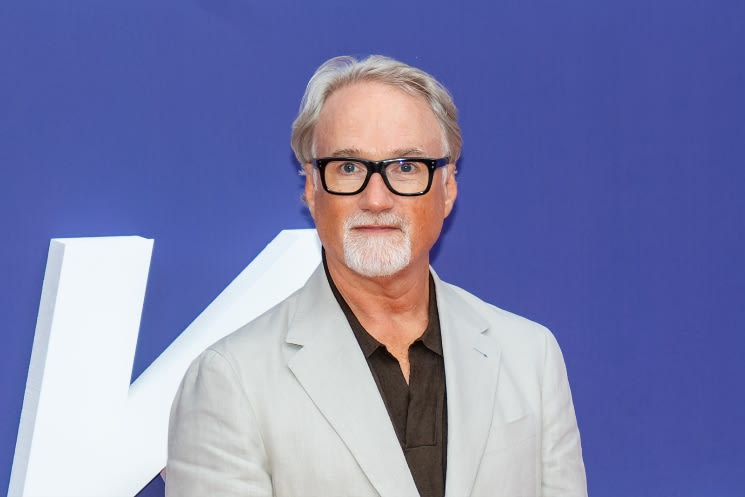Even I know that the first rule of Fight Club is you don't talk about Fight Club, but here we are. Decorated filmmaker David Fincher probably wouldn't want me to talk about it either — and he definitely doesn't like the way today's manosphere does.
While promoting his latest film The Killer in a new interview with The Guardian, the director addressed how the 1999 cult classic, adapted from the 1996 Chuck Palahniuk novel about some dudes beating the shit out of each other, has become maligned thanks to its embrace by a specific sect of modern-day alt-right misogynists and supremacists.
As the article lists, the likes of incels and neo-Nazi fitness clubs, even the Proud Boys — who the Southern Poverty Law Centre once literally described as an "alt-right fight club") — have made Fight Club a key text: "Its general treatise on the ennui, impending obsolescence and self-pitying grievance of the white American male seems to have anticipated the zeitgeist — and possibly shaped it," wrote journalist Steve Rose.
"I'm not responsible for how people interpret things," Fincher told Rose. "Language evolves. Symbols evolve."
Whether or not he takes responsibility, it feels undeniable that the film has had a profound impact on modern masculinity. When Rose pressed about Fight Club becoming a touchstone for the far right, Fincher reportedly seemed "slightly exasperated" by the line of questioning. "OK, fine," the filmmaker said. "It's one of many touchstones in their lexicography."
He continued, "We didn't make it for them, but people will see what they're going to see in a Norman Rockwell painting, or [Picasso's] Guernica."
"It's impossible for me to imagine that people don't understand that [Brad Pitt's character, the violent alter-ego to Edward Norton's narrator] Tyler Durden is a negative influence," Fincher added. "People who can't understand that, I don't know how to respond and I don't know how to help them."
It's not that he can't sympathize with the struggle of not fitting into a larger societal mould, though. "I honestly believe that the high school quarterback who's dating the homecoming queen cheerleader — even that guy thinks he's an outsider. Who doesn't think that they're an outsider?" the director said.
"That's the fundamental difference between me and Tim Burton," Fincher emphasized. "Tim Burton believes that Edward Scissorhands is an anomaly. I just don't know anybody who doesn't think, in some kind of way, that they're Edward Scissorhands."
While promoting his latest film The Killer in a new interview with The Guardian, the director addressed how the 1999 cult classic, adapted from the 1996 Chuck Palahniuk novel about some dudes beating the shit out of each other, has become maligned thanks to its embrace by a specific sect of modern-day alt-right misogynists and supremacists.
As the article lists, the likes of incels and neo-Nazi fitness clubs, even the Proud Boys — who the Southern Poverty Law Centre once literally described as an "alt-right fight club") — have made Fight Club a key text: "Its general treatise on the ennui, impending obsolescence and self-pitying grievance of the white American male seems to have anticipated the zeitgeist — and possibly shaped it," wrote journalist Steve Rose.
"I'm not responsible for how people interpret things," Fincher told Rose. "Language evolves. Symbols evolve."
Whether or not he takes responsibility, it feels undeniable that the film has had a profound impact on modern masculinity. When Rose pressed about Fight Club becoming a touchstone for the far right, Fincher reportedly seemed "slightly exasperated" by the line of questioning. "OK, fine," the filmmaker said. "It's one of many touchstones in their lexicography."
He continued, "We didn't make it for them, but people will see what they're going to see in a Norman Rockwell painting, or [Picasso's] Guernica."
"It's impossible for me to imagine that people don't understand that [Brad Pitt's character, the violent alter-ego to Edward Norton's narrator] Tyler Durden is a negative influence," Fincher added. "People who can't understand that, I don't know how to respond and I don't know how to help them."
It's not that he can't sympathize with the struggle of not fitting into a larger societal mould, though. "I honestly believe that the high school quarterback who's dating the homecoming queen cheerleader — even that guy thinks he's an outsider. Who doesn't think that they're an outsider?" the director said.
"That's the fundamental difference between me and Tim Burton," Fincher emphasized. "Tim Burton believes that Edward Scissorhands is an anomaly. I just don't know anybody who doesn't think, in some kind of way, that they're Edward Scissorhands."
